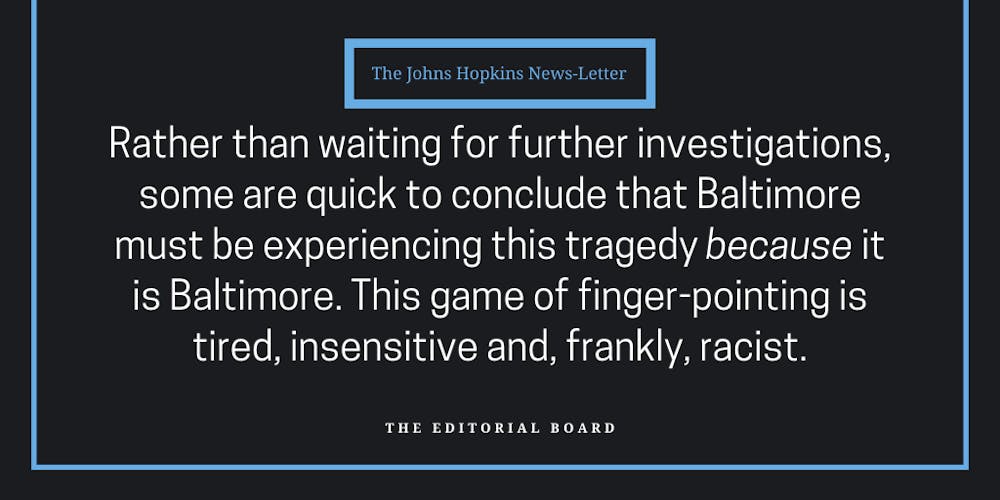Many of us woke up last Tuesday to the heartbreaking news that Baltimore’s Francis Scott Key Bridge had collapsed. The bridge was struck by the Dali, a Singaporean-flagged cargo ship en route to Sri Lanka.
Of the eight people who were on the bridge at the time of its collapse, two were rescued, the bodies of two were recovered and four others are presumed dead. Baltimore is mourning the lives of Miguel Luna, Dorlian Castillo Cabrera, Maynor Yassir Suazo Sandoval, Jose Mynor Lopez, Alejandro Hernandez Fuentes and Carlos (full name not yet released), who were part of a construction crew filling potholes on the bridge. The News-Letter sends our deepest condolences to their families for this devastating loss.
The six workers were immigrants from Latin America. Following the collapse of the Key Bridge, Latino immigration and advocacy groups in Maryland, including CASA, have renewed calls for the federal government to increase protection for immigrant construction workers. The News-Letter echoes these demands. The Hispanic population makes up an estimated 30% of the nation’s construction workers, and the construction and extraction industry had the second most fatalities out of all industries in 2022.
Without construction workers, our city would not be able to function. Immigrant workers are particularly vulnerable to exploitation and they deserve enhanced protections.
The Key Bridge has been a fixture of Baltimore since its opening in 1977 and functioned as a critical piece of infrastructure for the city. The Maryland Transportation Authority estimated that 31,000 vehicles crossed the bridge a day, adding up to over 11 million vehicles yearly — all of which will have to re-route for the foreseeable future.
Furthermore, shipping traffic through the busy Port of Baltimore cannot continue until the wreckage of the collapse has been cleared (predicted to take weeks), spelling serious trouble not only for Baltimore but also for the wider U.S.
The economic effects of the collapse will reverberate nationally, as the Port of Baltimore is a major drop-off point for goods on their way to the East Coast and the Midwest. Together, the Patapsco River and the Port of Baltimore generate more than $3.3 billion a year, and the closure of the shipping channel is estimated to trigger a staggering loss of $191 million a day.
An estimated 15,000 jobs dependent on the Port of Baltimore are now in a precarious position, with many port workers reporting that they are suddenly out of work. The Maryland Senate is currently deliberating an emergency bill that would pay the workers impacted by the crisis, and we urge them to pass the legislation quickly so that aid may reach those who need it.
Internet trolls are using this tragedy as an opportunity to lambaste Baltimoreans’ elected officials, such as Mayor Brandon Scott and Governor Wes Moore. Rather than waiting for further investigations, some are quick to conclude that Baltimore must be experiencing this tragedy because it is Baltimore. This game of finger-pointing is tired, insensitive and, frankly, racist.
During this difficult time, we should focus on supporting the impacted families and the city as it rebuilds, rather than assigning blame. We are a part of the city of Baltimore. It is vital, now more than ever, that we band together.
For those looking for ways to help, consider donating to the families of the affected construction workers. A few options are CASA, the Baltimore Civic Fund and GoFundMe.
Mental Health Services can be reached at (410) 516-8278 on Monday, Tuesday, Thursday and Friday from 8:30 a.m.–6 p.m. (closed 12–1 p.m.) as well as Wednesdays from 1–6 p.m. Please leave a message during the 12–1 p.m. hour or press 1 to reach the on-call counselor.
If you or someone you know is experiencing a crisis, contact the Behavioral Health Crisis Support Team at (410) 516-WELL (9355) to speak with a crisis support clinician.
Student Outreach and Support is available for appointments by calling (410) 516-7857 or scheduling through their website.
Religious and Spiritual Life can be reached at (410) 516-1880 from 8:30 a.m.–5 p.m. from Monday through Friday.
A Place to Talk peer listening group is available Sunday through Thursday, 7 p.m.–1 a.m. in Brody Learning Commons 4010 and 7–11 p.m. in AMR I.
The TalkNow virtual counseling service is available through timelycare.com/jhu.
Students who live in residence halls may contact their Resident Advisor or Residence Director or stop by a Residential Life office. Residential Life can be contacted by phone on (410) 516-8283 or by email to residentiallife@jhu.edu.
Additional health and well-being resources provided by the University can be found on the well-being website.





